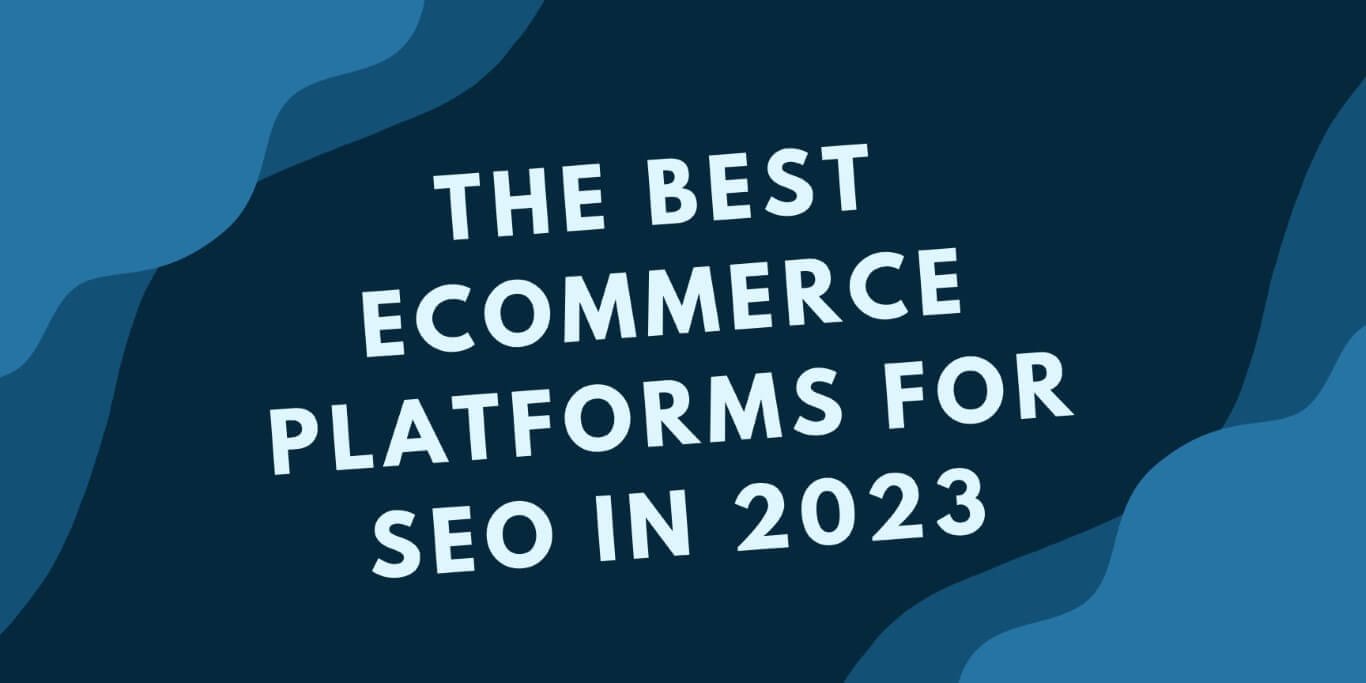
The Best Ecommerce Platforms for SEO in 2023
Your staircase to success begins from here
A lot of hard work goes into creating a company’s website and spreading awareness about the same, and now it’s time to be on top of your customers’ and prospects’ search pages by figuring out the best e-commerce store for your company. You can sell your services and products and understand what your customers and prospects expect from you on this platform.
Here’s a list of top-ranking e-commerce platforms for SEO that’ll help you boost your business:
A. Bigcommerce
BigCommerce is a site making it to the top of the e-commerce list as it offers a platform to companies who want to build an online store.
This platform is designed for SEO that offers features like a built-in blog, optimized product pages, and automatic sitemap generation.
BigCommerce is considered the most-trusted B2B and B2C e-commerce solution by IDC, Forrester, and Gartner and has an app store that offers additional features, such as email marketing and social media tools.
Here are some pros and cons of the platform that’ll help you make the right choice.
PROS:
1. Flexible:
If you are a starter or experienced, all you require are tools that will make it easy to create a site just the way you need. BigCommerce is exceptionally flexible and doesn’t ask you to be well-versed in coding, making it a cakewalk.
2. SEO-friendly:
SEO is crucial for a website to boost. When choosing the best e-commerce platform for SEO, do look for SEO-friendly features that’ll be a boon for your business.
Some of the SEO-friendly features offered by BigCommerce are:
- Mobile-friendly design
- Built-in 301 redirects
- SEO-friendly URLs
- Edit access to your robot.txts file
3. Customer-friendly:
BigCommerce is the best SEO e-commerce platform because it’s customer-friendly. This platform offers numerous e-commerce website features that you can use to make it an incredible shopping experience for your audience.
For example, Paying online is a hassle, and customers have a hitch making huge transactions. But BigCommerce makes it as easy as a swipe for the customers. It enables you to accept 40 different payment methods, making it an easy and enjoyable experience.
CONS:
1. Slow-loading page:
Nobody likes to wait for their page to load. Hence, slow-loading pages are pernicious to SEO, leading to lower rankings on customers’ and prospects’ search pages, lessening the traffic and sales. And nobody wants their hard work to go in vain.
Unfortunately, slow-loading websites cause $2.6 billion in revenue loss annually.
2. Expensive:
Everybody wants a good e-commerce platform for their business to flourish. BigCommerce offers a Pro package that enables you to get up to $400,000 in sales per year, but for every $200,000 in sales beyond that, you’ll have to invest an extra $150 per month. So, if your business happens to make it over that threshold, you must opt for an Enterprise plan, which is more expensive.
B. Magento (also known as Adobe Commerce)
Magento, also known as AdobeCommerce, has been a big shot in the e-commerce world for a while now. As a part of Adobe Cloud Experience, it gives access to other Adobe tools like Adobe Target and Adobe Analytics.
This platform offers features like product categorization and management, shopping cart functionality, order management, and many more. Due to its versatility and scalability, it is a popular option for developers and enterprise-level enterprises.
It is a fantastic option for companies searching for an e-commerce platform to assist them in optimizing their store for search engines. It enables you to make unique URLs for your products and optimize them with rich snippets and meta tags.
Adobe Commerce is a perfect option for a self-hosted e-commerce platform if you believe in SEO and don’t mind investing more.
Here are some pros and cons for you.
PROS
1. Customizable:
Many companies prefer Magento as it is an open source that allows anyone to customize the site just as they need. Whether you need a complex navigation bar or a unique check-out process, Magento gives you the freedom to adapt as you need. You get a basic website layout that you can modify to suit your company’s needs. You are given complete customization options without having to start from scratch.
2. SEO-friendly:
You may customize this eCommerce SEO platform to make it SEO-friendly for your company. You can add the coding and make necessary changes to improve your page’s ranking in search results and increase sales.
CONS
1. You need to be well-versed in coding:
It might not be the finest e-commerce SEO tool for you if you don’t know how to code. You need to have specific skills to customize Magento as per your preferences. You won’t be able to create a unique website for your company without knowing how to code.
2. Hosting can be expensive:
The biggest drawback of Magento is the cost. Every year you have to invest $20,000 to get the basic version of their product that offers limited features. The more you need, the higher the price you pay.
C. Shopify
This platform is a good choice for e-commerce businesses of all sizes and a perfect option for those kick-starting their company. It is an easy-to-use platform with built-in SEO features like an abandoned cart recovery system and the ability to add alt text to images.
Here are some pros and cons of Shopify.
PROS
1. Offers Plugins:
Adding various features to your Shopify store is always a great decision. You can do so with their library of plugins such as SEO booster, voyager up-sell and cross-sell.
2. User-friendly:
Shopify is one of the effortless websites to utilize for opening a store. Users can choose a template, add what they need, and establish their store with the help of this platform. It’s excellent for business owners who aren’t coders.
3. Top blogging features:
Blogging is the key component of SEO. The blogging tool in this e-commerce platform makes it simple for your online store to produce and share high-quality content. By blogging, you can attract more visitors to your website.
4. Ready with Google Analytics:
Shopify features some of the best tracking data, and you can use Google Analytics to add more accurate tracking to your website. It makes it simple to keep track of your company’s traffic, leads, and conversions.
CONS
1. Once a part of Shopify, it’s difficult to exit:
Exiting this platform isn’t easy. As the lock-in feature impedes you from taking your store elsewhere. If you ever decide to move out of Shopify, you’ll only be able to retrieve your CSV report. So, before hopping onto this platform think if you want to stay here for a long time.
2. Content marketing isn’t easy:
Promoting your business is equally important as starting your business. And content marketing is the route to reach your target audience. The problem with Shopify’s in-built blogging feature is that it lags a lot. For example, the blogging feature has no category which means you need to include tags in your post, unvarying blog layouts, and an outdated editor as well.
D. WooCommerce
Millions of online stores use WooCommerce, one of the most widely used open-source e-commerce platforms available today. It is excellent for SEO because it is simple to use and packed with capabilities that can increase the rating of your website in search results.
It allows you to adjust your title tags, meta descriptions, and URLs to optimize your sites for particular keywords. It also features a built-in sitemap tool that makes it simple for Google to index your products.
Here are some pros and cons of this platform.
PROS
1. Fully customizable:
WooCommerce helps you customize your site better than other e-commerce SEO platforms making it a favorable choice for many companies. With tons of plugin options, you can build a site that boosts your business by enabling you to sell products effectively.
2. Strong Tech Support:
The WooCommerce plugin helps you resolve tons of issues and queries asked by your customers. This feature makes it a better platform for SEO than WordPress, an open-source platform that people need to continually work on and tweak the plugins to make their site better.
3. SEO ready:
WooCommerce is another platform which is built to help you rank in search engines. It comes with numerous SEO-friendly features, including:
- URL customization
- Built-in 301 redirects
- Mobile-friendly
- Built-in blogging
- robots txt editing
CONS
1. Requires tech knowledge:
WooCommerce is a challenging platform for those who don’t know how to code. But it is good, as it has a learning curve. You will take time to learn WordPress and plugins, which can be demanding if you want to set up your e-commerce store fast.
2. Needs multiple plugins:
The fact that you have to install various plugins to use particular functionality on your website prevents WooCommerce from becoming the ideal e-commerce platform for SEO. Finding plugins that provide the functionalities you require takes time. Making sure plugins can communicate with one another also takes time.
Conclusion
Make a list of the features you appreciate about each product and make notes regarding the migration process now that you’ve seen some of the best options for e-commerce SEO platforms.
You must have characteristics even if you don’t use WooCommerce’s blog-ready designs or Magento’s customization. Check that list right now.
We are here to reassure you that you can have it all, despite your frustration that there isn’t a single tool that can do it all. When you work with an e-commerce web design business, you may get a unique package that includes everything you require, including customization, a blog, and SEO-friendly design.


